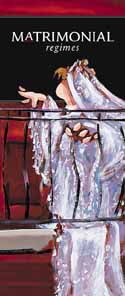 |
< Back
 MATRIMONIAL REGIMES
MATRIMONIAL REGIMES
 
Husbands and wives are equal before the law
Whether a wedding is civil or religious, certain requirements relating to age, capacity, matrimonial status, blood ties, the officiating minister or official, and the publication of certain notices must be met. Both spouses, necessarily a man and a woman, have the same rights and obligations. They owe each other respect, fidelity, succour and assistance. Each spouse retains his given names and surname after marriage. Both equally share the moral and material responsibility for the family and exercise parental authority together.
THE CHOICES
All spouses, whether united by civil or religious marriage, have a matrimonial regime. The regime lays down the rules for the economic relationship between the spouses and the fate of their property when the regime is dissolved.
The matrimonial regime comes into effect upon the solemnization of the marriage-or the date of the deed changing the regime-and ends on a judgment of divorce or nullity of marriage or on the death of one of the spouses, It may also be dissolved by the spouses' decision to adopt a new matrimonial regime by notarial deed.
The Civil Code of Québec expressly provides for rules concerning two matrimonial regimes: partnership of acquests and separation as to property.
The regime of partnership of acquests applies automatically to all couples married since July 1st, 1970, and who have not made a marriage contract. It is called the legal matrimonial regime. Spouses may also opt for the regime of partnership of acquests by marriage contract signed before a notary, and add other conditions or particulars to it.
The regime of separation as to property cannot be adopted otherwise than by a contract signed before a notary. In marriage contracts, all agreements that are not contrary to law are possible between spouses.
Spouses married before July 1st, 1970, who have never signed a marriage contract are subject to the regime of community of movables and acquests, better known as community of property. This regime is no longer governed by the Civil Code of Québec, but couples already married under it nevertheless continue to be governed by its rules. Newly married couples may also, by notarial marriage contract, choose a community-type matrimonial regime.
THE REGIME OF PARTNERSHIP OF ACQUESTS
In partnership of acquests, there are two types of assets: "private property" and "acquests". Private property is usually acquired before marriage or received during the regime by gift or inheritance. All property not considered private by law is an acquest.
Under partnership of acquests, each spouse administers his own private property and acquests, subject, in the case of gifts of his acquests during his lifetime, to the consent of the other spouse. Other restrictions also apply with respect to family residences and movable effects which serve for the use of the household. When the regime is dissolved, each spouse may demand the division of the acquests of the other in accordance with established rules.
THE REGIME OF SEPARATION AS TO PROPERTY
The regime of separation as to property recognizes only "private property". Each spouse administers his own property or assets alone and may dispose of them as he sees fit, subject to provisions protecting family residences and movable effects which serve for the use of the household.
Separation as to property has the advantage of ensuring the complete autonomy of each spouse and protecting a spouse against the errors or financial difficulties of the other. It can, however, result in some unfairness towards the financially weaker spouse, especially in the event of dissolution of the regime.
FAMILY PATRIMONY AND COMPENSATORY ALLOWANCE
Certain provisions of the Civil Code of Québec apply to all spouses, regardless of their matrimonial regime.
The family patrimony provisions came into effect July 1st, 1989. Marriage now automatically includes the creation of a family patrimony. In the event of separation as to bed and board, or the dissolution or nullity of marriage, the value of the family patrimony is divided equally between the spouses or between the surviving spouse and the heirs, as the case may be.
Certain rules ensure the protection of the family residence(s) during the marriage. In most cases, a spouse may not sell or even hypothecate a family residence of which he is the sole owner without the written consent of the other spouse. However, this protection is only partial unless the non-owner spouse has caused to be published at the registry office a declaration of family residence. Similarly, a spouse may not, without the consent of the other spouse, alienate, hypothecate or remove from the family residence the movable property serving for the use of the household.
For more information, consult the leaflet called "Family Patrimony".
The court, in declaring separation from bed and board, divorce or nullity of marriage, may order either spouse to pay to the other an allowance as compensation for the latter's contribution, in property or services, to the enrichment of the patrimony of the former. The same applies on death.
The choice of matrimonial regime does not always get the attention it deserves. You should consult your notary. He can help you analyze your situation and guide you in the choice of a matrimonial regime suitable to your needs.
Consult your notary: he leaves nothing to chance.
|







